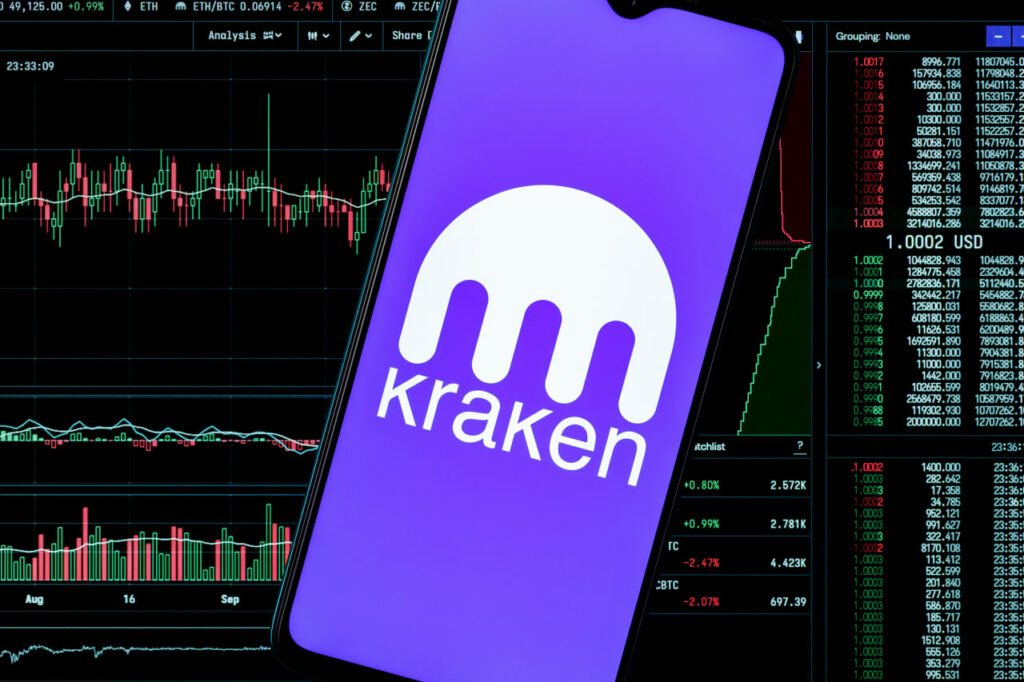Kraken, the third largest crypto exchange by volume on CoinMarketCap, has announced its plans to launch its own bank soon.
The announcement comes at a time of regulatory scrutiny and increasing caution from banks regarding the crypto sector.
During The Scoop podcast with Frank Chaparro on The Block, Kraken’s Chief Legal Officer, Marco Santori confirmed that Kraken Bank is on track to launch soon. He also expressed enthusiasm about the launch, stating that they plan to order thousands of pens with their logo and attach them to the desks of Wall Street banks everywhere.
Regulatory challenges don’t stop Kraken’s plans
Kraken has recently come under the Securities and Exchange Commission (SEC) radar for allegedly offering unregistered securities to American clients.
Dave Ripley, who recently became the CEO at Kraken, chose not to register with the SEC despite calls from Chairman Gary Gensler to do so.
Binance, the largest crypto exchange, has also faced consequences for trading unregistered securities.
Santori chose not to delve into the SEC settlement details but noted that staking had contributed minimally to Kraken’s revenue. He clarified that Kraken neither admits nor denies the allegations in the complaint.
However, he acknowledged that the SEC move would significantly impact Kraken’s product mix in the U.S., forcing American clients who want staking services to resort to offshore exchanges that are much riskier.
He expressed his disappointment with the regulatory environment in the U.S. and how it forces users to use offshore exchanges that readily accept their business, requiring as little as a VPN.
Kraken’s recent challenges with enforcement actions
Kraken has settled a case with the Office of Foreign Assets Control (OFAC) over sanctions violations and paid $362,000. Kraken also faced enforcement actions in the past weeks, leading to uncertainty in the regulatory area.
However, Kraken’s Chief Legal Officer remains optimistic, saying that Kraken Bank is on track to launch very soon.
Santori also mentioned that Kraken’s banking relationships are secure, and the exchange has a diversified group of banks worldwide.
He warns that the increased caution on the banking front could stifle innovation in the sector, making it a tough road for those who have new ideas to provide infrastructure to the crypto economy.
“We’re returning to an era where banks are going to be very cautious as to what accounts they open,” he said. “Wall Street is going to be fine. Kraken and Coinbase are going to be okay. But the guy or gal who has a new idea about how to provide infrastructure to the crypto economy, it’s going to be a really tough road over the next few years for them. No question.”
Kraken Bank’s launch is good news for the industry, especially as crypto-friendly bank Silvergate shut down its widely-used Silvergate Exchange Network amid capitalization troubles.
Kraken’s decision to launch its bank despite the challenging regulatory environment and recent shuttering of its on-chain staking services for U.S. clients shows the exchange’s commitment to the sector’s growth.
However, the industry’s ongoing probe from regulators is not a good look, and Santori warns that the issue could become electoral fodder as the presidential race kicks off in the country.
Santori emphasizes that there is no conspiratorial crackdown on the crypto sector in the U.S. but rather a group of regulators who all feel roughly the same way about crypto.
Kraken Bank’s launch will enable the exchange to have better control over its banking services, ensuring that its clients’ needs are met.
“There’s definitely not some anti-crypto group that meets every week in some shadowy room in D.C.,” Santori said. “But there are a group of regulators who happen to all feel roughly the same way about crypto … I think they just believe basically in one fundamental thing, that what crypto is today is what’s important, and what it will be or could be in the future is really not.”
